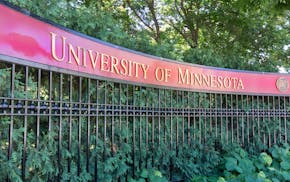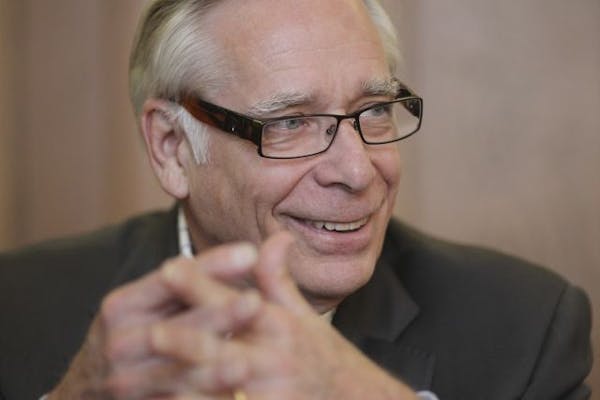University of Minnesota President Eric Kaler used his first State of the University address Thursday to propose "new ways to work smarter" -- including switching to a year-round academic calendar.
That "remarkably revised" calendar might include three terms of equal length, making it possible for a full-time student to earn the 120 credits needed for a bachelor's degree in less than three years, he said.
Kaler also urged more robust state support as a way to minimize or eliminate tuition increases, previewed his upcoming budget and pointed out processes that ought to be speeded up and places where things can be cut. Among them: ridding the U of "extremely stupid procedures" and eliminating outdated, ineffective academic centers.
"I was surprised to find out -- and you may be surprised, too -- that we have 265 academic centers and institutes," he said, "and they have budgets totaling more than $200 million."
Kaler has directed deans to examine them: "We may find that some, and maybe even most, remain valuable and relevant, but I'm willing to bet others are not."
The speech, titled "Balances," contained some of Kaler's most specific ideas since he became president last summer and again hit on his hope to make the culture of the public university system more innovative and nimble.
A new schedule?
A year-round calendar that helps students lop a year off their bachelor's degree is a hot idea in higher education these days.
At the U, a six-member committee recently studied the idea of a summer term equal in length to fall and spring semesters. Such a schedule could "enhance the learning experiences of students, allow flexibility for students to accelerate their degree completion and to provide opportunity for increased revenue for colleges," according to the group's report, submitted in January 2011.
But that report also described drawbacks, including a mismatch with students' financial aid schedules.
"Virtually all aid is tied to a two-semester limit," the report notes, "so even if a student attends in the summer they may not be able to receive financial aid because they have used up the annual amount available to them during the fall and spring semesters."
Kaler on Thursday acknowledged those "big" challenges -- "chief among them managing financial aid for students." But he listed pluses, including better use of lab and classroom space, more tuition revenue and flexibility for faculty, who would still teach two semesters a year but "might choose to teach three semesters from time to time for additional compensation."
"We'd need a transition time to move to the new model," Kaler said. "In the balance, I think the benefits outweigh the challenges, and this is an idea well worth driving forward."
Kaler's reasoning worried Eva von Dassow, an associate professor in the Department of Classical and Near Eastern Studies.
"By pointing to, 'We can increase tuition revenue, we can speed up students getting degrees,' he presupposes a model of what we do that is analogous to making widgets or something," she said. "The focus on time to degree and graduation rates compresses the possibility of an education that is truly exploratory."
Von Dassow was one of several faculty members who, during a question-and-answer period after Kaler's speech, pressed him on topics including pay packages for administrators, rising tuition and problems with the U's decentralized budget model.
Becoming 'more nimble'
In his address, Kaler previewed the budget for fiscal year 2013 that he will present to the U's Board of Regents in May. It will include a 2.5 percent pay increase for all employees, Kaler announced to some applause in the packed Coffman Memorial Union Theater. It also carves out a $21 million pool for academic investments, to be awarded competitively. And it includes no increases in the U's "cost pools," which pay for services and administration.
"I pledged to hold the line on administrative costs, and this budget does that," he said.
Kaler also announced a new "entrepreneurial leave," with no salary but with full benefits, for tenured and tenure-track faculty to work full time on projects outside the university. "Basically, if you have a commercial, artistic or creative idea you'd like to explore, we will hold your place here," he said.
But no matter how efficient the U becomes, Kaler said, the state must do its part in minimizing tuition increases. The U's tuition and fees have doubled over the past decade, reaching $13,060 for resident undergrads, not including room and board. "The fantasy that somehow the university could advance its mission and hold the line on tuition as state support dwindles is just that: a fantasy."
Jenna Ross • 612-673-7168

Going to the Timberwolves or Twins games tonight? Here's how to get there, and maybe even avoid traffic
Focusing on bringing football film into frame

